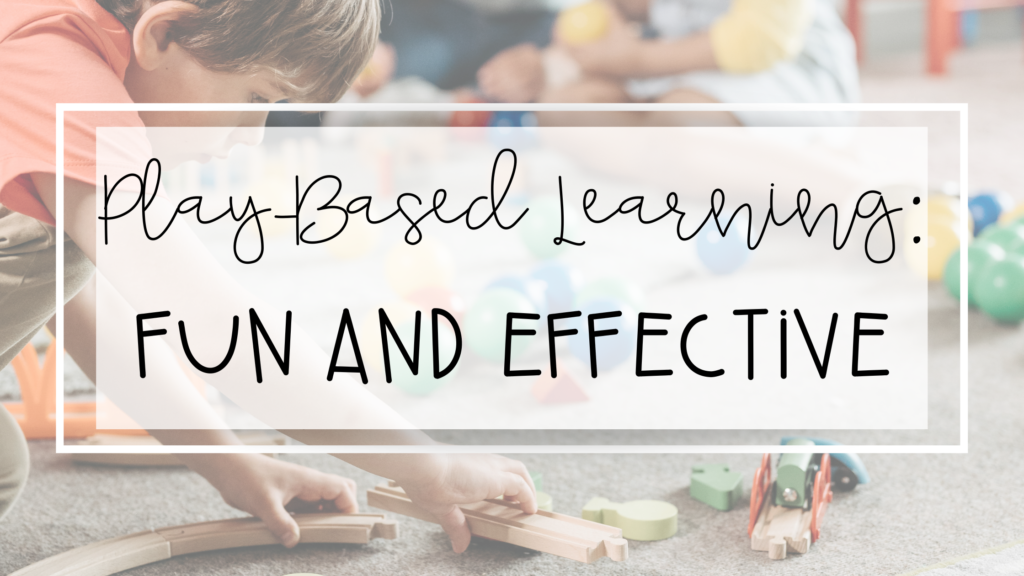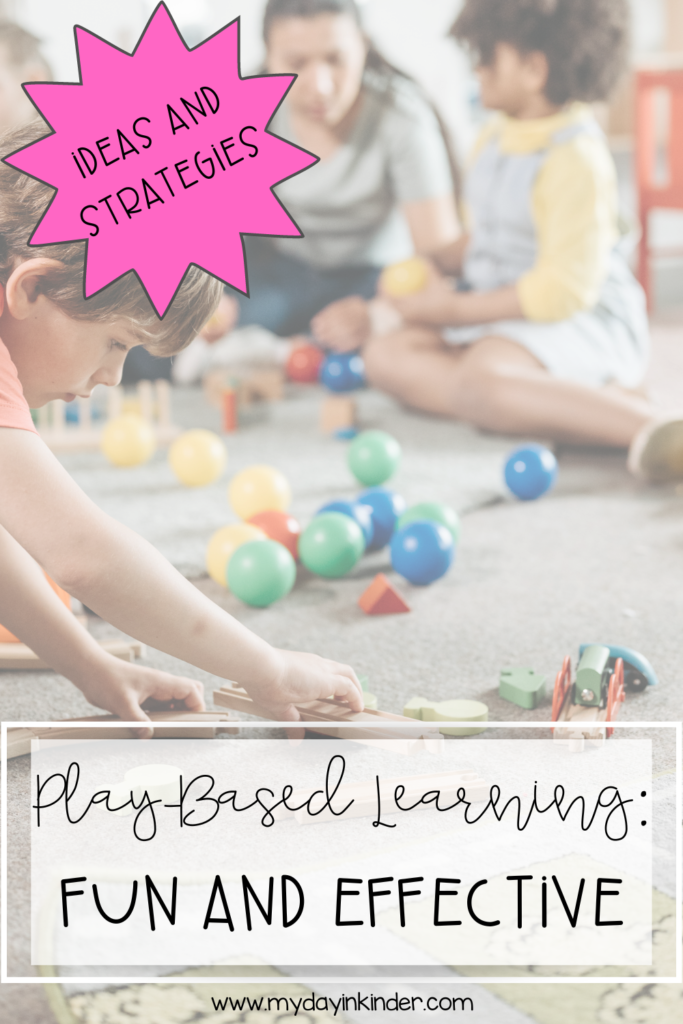Play-Based Learning: Strategies for a Fun and Effective Classroom
Are you looking for a way to make learning more engaging and effective for your young students? Look no further than play-based learning! This approach leverages play’s natural curiosity and joy to foster cognitive development, social skills, and academic learning in young children. Let’s explore play-based learning, why it’s beneficial, and how to incorporate it into your classroom.

What is Play-Based Learning?
Play-based learning is an educational approach that uses play as the primary mode of learning. Instead of relying solely on direct instruction, this method encourages children to participate in their learning through various play activities actively. These can include free play, dramatic play, sensory play, and structured play activities that are designed to meet specific learning goals.
In a play-based program, children engage in different types of play, such as pretend play, imaginative play, and physical play, which help them explore the world around them. This type of learning environment allows children to learn at their own pace and follow their own interests, making learning more meaningful and enjoyable.
Why Use Play-Based Learning?
Recent research highlights the numerous benefits of play-based learning. Unlike traditional academic learning, which often focuses on rote memorization and direct instruction, play-based learning allows children to explore their own interests and engage in meaningful learning experiences. This approach supports the development of a wide range of skills, including:
Cognitive Development
Play-based learning helps children develop critical thinking and problem-solving skills. Through playful learning, children learn to think creatively and explore new concepts in a hands-on way. Activities like building with blocks or solving puzzles enhance cognitive skills and promote active engagement.
Social Skills
Social interactions during play teach children important interpersonal skills, such as communication, cooperation, and conflict resolution. These interactions are crucial for social development and building positive relationships. Play-based learning encourages children to work together, share, and take turns, which are essential skills for their future success.

Physical Development
Physical play, including activities that enhance fine motor skills and hand-eye coordination, supports overall physical development. Children develop their physical abilities through active play or art projects while having fun. Activities like running, jumping, and climbing help build gross motor skills, while activities like drawing and cutting improve fine motor skills.
Language Development
Engaging in pretend play and other playful activities helps children develop their language skills. They learn new words, practice communication skills, and enhance their ability to express themselves. Storytelling, role-playing, and singing are great ways to promote language development in young children.
Emotional Development
Play allows children to explore different roles and scenarios, which can support emotional development. Children learn to understand and manage their emotions through imaginative play and dramatic play. They also learn empathy and perspective-taking by engaging in different roles during play.
Benefits of Play-Based Learning
The benefits of play-based learning extend beyond just having fun. Here are some key advantages:
Active Engagement: Children are naturally more engaged when they are having fun. This type of learning keeps children actively involved in their learning, making the experience more enjoyable and memorable. This active engagement leads to a deeper understanding and retention of new concepts.
Solid Foundation for Future Success: Early childhood education that incorporates play-based learning helps build a solid foundation for future academic and social success. Skills developed through play, such as critical thinking and problem-solving, are essential for lifelong learning. These skills prepare children for more complex tasks and challenges in their future education.
Positive Attitude Toward Learning: Play-based learning fosters a positive attitude toward learning. When children associate learning with play, they develop a love for discovering new things and a curiosity that will serve them well throughout their educational journey. This positive attitude helps children approach learning with enthusiasm and confidence.
Ideas for Play-Based Learning Activities
Incorporating play-based learning into your classroom can be both fun and effective. Here are some ideas to get you started:
Dramatic Play Areas
Create themed play areas where children can engage in pretend play. These could include a grocery store, a doctor’s office, or a space station. Provide different items and props to encourage imaginative play. For example, in a grocery store, children can take on different roles like cashier, customer, and stock clerk, practicing social interactions and language skills.
Sensory Play
Set up sensory play stations with natural materials like sand, water, and clay. Sensory experiences are great for developing fine motor skills and encouraging exploration. Sensory play also helps children learn about different textures, temperatures, and consistencies, enhancing their sensory development.

Storytelling and Role-Playing
Encourage language development and communication skills through storytelling and role-playing activities. Let children take on different roles and create their own stories, fostering creativity and narrative skills. Use props, costumes, and puppets to make the stories more engaging and interactive.
Art Projects
Incorporate art projects that allow for open-ended play and creativity. Provide various materials and let children create their own masterpieces. This not only enhances fine motor skills but also encourages self-expression. Activities like painting, drawing, and sculpting allow children to explore their creativity and develop their artistic abilities.

Outdoor Play
Take learning outside with physical activities that promote gross motor skills and teamwork. Activities like obstacle courses, scavenger hunts, and group games are excellent for physical development and social skills. Outdoor play also allows children to explore nature and learn about their environment.
Board Games and Puzzles
Use board games and puzzles to teach academic skills like counting, matching, and problem-solving. These games also promote social interactions and teamwork. Choose appropriate games for the age group and provide opportunities for critical thinking and strategy.

Science Experiments
Simple science experiments can be a great way to introduce children to scientific concepts and critical thinking. Activities like mixing colors, planting seeds, or observing insects can spark curiosity and a love for science. These experiments also provide opportunities for hands-on learning and exploration.
Teacher’s Role in Play-Based Learning
As an early childhood educator, your role is crucial in facilitating play-based learning. Here are some ways to support your students:
Play-Based Learning Environment
Creating a play-based learning environment involves designing your classroom to encourage play and exploration. Set up play areas with various materials and resources that stimulate different types of play. Ensure that the environment is safe, inviting, and conducive to play. This setup might include dedicated spaces for dramatic play, sensory activities, and physical play, all with the necessary materials to support these activities.
Observing and guiding children during play helps you understand their interests and developmental needs. Guide their play by asking open-ended questions and providing prompts encouraging deeper thinking and learning. For example, you can ask, “What do you think will happen if we add more water to the sand?” to encourage critical thinking. This approach helps children explore their ideas and enhances their learning experience.
Learning Goals and Social Interactions
Incorporating learning goals into play activities ensures that play remains purposeful. While play should be child-led, you can plan activities that align with your curriculum and learning objectives. For instance, setting up a math-themed play area with counting games and shape recognition activities can seamlessly integrate academic skills into playful learning.
Encouraging social interactions through play fosters positive relationships and interpersonal skills. Promote cooperative play and group activities to help children navigate social dynamics and develop teamwork skills. Providing opportunities for children to work together on projects and solve problems collaboratively enhances their social development and prepares them for future interactions.
Using positive reinforcement to encourage desired behaviors during play is essential. Praise children for their efforts, cooperation, and creativity. This approach helps build a positive learning environment and motivates children to engage in play-based learning activities. Positive reinforcement reinforces good behavior and encourages children to continue participating enthusiastically.
Adapting play-based activities to meet the individual needs of your students recognizes that each child is unique. Children may have different interests and developmental levels, so providing various materials and activities can cater to different learning styles and preferences. Acknowledging and adapting to these differences creates an inclusive and supportive environment that benefits all students.
Embracing Play-Based Learning
This is a powerful approach to early childhood education that leverages the natural curiosity and joy of play to foster cognitive, social, and physical development. By incorporating these types of activities into your classroom, you can create a positive and engaging learning environment that supports the whole child. From dramatic play to sensory experiences, there are countless ways to make learning fun and meaningful.
Embrace the power of play and watch your students thrive! Remember, the key to successful play-based learning is to create a supportive environment where children feel free to explore, imagine, and learn at their own pace. Our role is to guide and facilitate this process, ensuring that each child has the opportunity to develop their full potential through play.

